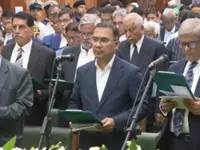PETALING JAYA: Parliament is set to become a training ground for future lawmakers under a revamped youth parliament programme which will see young leaders contest elections as prospective MPs.
Under the programme’s new format, these young leaders will form political parties and stand for special elections, following the same rules that govern present polls, said Dewan Rakyat Speaker Tan Sri Johari Abdul.
“We want to introduce a new way of doing politics in Malaysia. The youth parliament programme which was under the youth and sports ministry has been passed to Parliament.
“It will be used as a platform to train young leaders. They start from there and they will end up here as future MP’s. But first, they must have exposure,” Johari said in an exclusive interview.
To make the experience as realistic as possible, youth candidates will have to undergo the full electoral process.
“I want them to start fresh. From how to form a party, what it takes to form a party, how do you draw up the manifesto and how do you form a coalition.”
Delegates will have to form fresh parties that are multiracial and not associate themselves with existing parties, he added. University students and alumni groups could also merge to form coalitions.
For a start, there will be seven parties this year, Johari said.
Under the training system, the youth candidates will have to campaign for support nationwide in a special election, where young voters can register and cast their ballots.
The programme will also provide opportunities for political debates and discussions.
“I want to train them for this. They should not be restricted by the current system,” he said.
The election for youth parliament is expected to take place in the first quarter of next year.
Aside from that, Parliament is also working with the Education Ministry on the Sekolah Parlimen programme which will allow head boys and girls to visit Parliament.
“The ministry agreed to (the proposal to) invite the head boys and head girls from rural areas who may not otherwise get a chance to visit Parliament. By organising these visits they will get an idea of what Parliament is about,” he said.
This programme is expected to begin after April.
The revival of national service (PLKN 3.0) will also help in producing more youth leaders, he said.
“Now we have a factory which produces thinkers. We equip them with the (right skills),” he said, adding that all Parliament needs is at least one per cent of every 100,000 youth trained.
“All we need is 2,000 youths a year. Then they can contest in the youth parliament,” he said.
The first Youth Parliament sitting convened in January 2015.
Under the present youth parliament system, selected young leaders aged 16 to 30 are chosen to simulate parliamentary proceedings in special sessions. Three sessions are held each year which run over three days.





